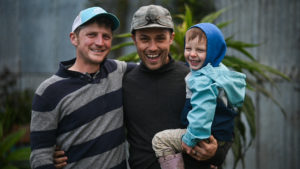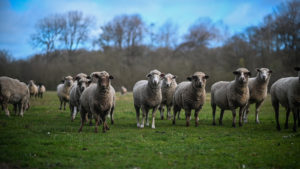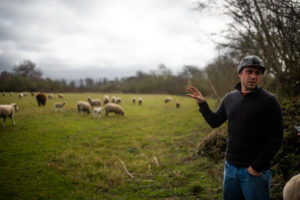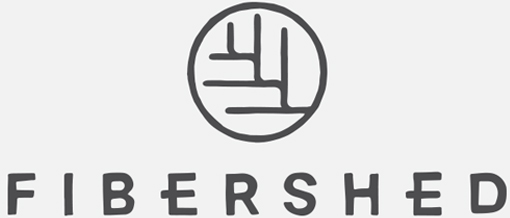Written and Photographed by Koa Kalish

Cody and Thomas Nicholson Stratton, otherwise known as the Foggy Bottoms Boys, are seventh-generation farmers in Ferndale, California. There, where the fog hangs low in the Eel River Valley, they run a multi-species farm, including a certified humane, organic dairy for milk, cheese, and beef, sheep for fiber and meat, and pastured poultry. Going viral from their TikTok videos with 90,000 followers and 10 million views, Cody and Thomas are raising awareness about local fiber while simultaneously increasing representation and visibility for the LGBT community in the agricultural world.
At the family farm, all four living generations are present at some point during the day. “There are my grandparents, who live halfway across the field and help with various aspects of feeding and washing eggs,” Cody explains. “They should be retired, but are still here every day. Then, my parents live a mile down the road and are involved predominantly with the cattle livestock business. They are more cow people, but when we need help with the sheep, they’re here as well. Then there is Thomas and I, and lastly, our son who is three. He helps too, and is great at putting stickers on egg cartons.”
Cody’s ancestors first emigrated from Denmark to Humboldt County in 1860, and started a dairy on Cock Robin Island, which sits in the middle of the Eel River. Growing up raising sheep, Cody received his first lamb when he was five, a holiday gift from his parents. Growing into a 4-H project, the initial lamb became a flock of registered Dorsets, and Cody began breeding them for natural colors. “I didn’t know much about fiber at the time, I just loved the colors,” he remembers.

Eventually, Cody left the farm to attend college, and sold off the flock. In 2014 he returned, bringing Thomas with him, who also had his own history and love for farming and agriculture. When they returned to Ferndale, Cody decided to keep a few Angora rabbits. “While raising Angoras, I wanted to do something with the fiber,” he says. He realized that blending Angora with sheep wool would be a good solution. “So I worked with Jill Hackett at Ferndale farms to get some fleeces, and we started milling our own yarn. I fell back in love with sheep.”
Cody’s inspiration and love for sheep sustained and in the year 2014, he and Thomas bought an entire flock, growing their sheep herd from nine to 50. It was a year later when they started making their own yarn. “We’ve been progressively growing our flock and integrating the sheep into the overall farm practice, using them to do grazing projects. And, soon we’re going to start incorporating them more into the dairy, for weed management.” Still, they focus the sheep mainly for fiber, and rotate them between three farms. They have about 120 now, with an ideal goal of 1,000!

“I grew up pretty unexcited about fiber, as most people are,” says Cody. “There was nothing very exciting about clothes, you know? And then, as we were raising sheep, we really started discovering the benefits of local fiber and the serious issues with fast fashion. We were always very conscious of what we ate, but not of what we put on our body. And so as we became more knowledgeable about fiber, that really drew our interest into generating quality fiber that people could use.”
The Foggy Bottoms Boys’ goal has been to produce fiber that is raised locally, milled locally, is high quality, and is affordable and accessible to all. “It is really important to us that our yarn is not super exclusive. Yes, that’s been hard to do. But that’s why we focus largely on natural colors, to not have the additional cost of dying the yarn.”
Cody and Thomas have gotten creative, offering social media live streams with Kool-Aid yarn dyeing demonstrations — an accessible way for people to learn about fiber, while being food safe and fun. “All people need is white wool and Kool Aid, and then they can do it with their children,” Cody says. “We’ve made TikTok videos about making rainbow yarn and having our son participate in it. It’s been fun for us to use our social media presence to share about fiber, to introduce people to it, and then to give people a pathway into working with it.”
Cody’s dream would be to see his sheep’s wool on the runway someday. “That’s why we’re breeding for high quality fleece. New York Fashion Week! I would love to see one of the designer’s looks have something from us. That would be my dream come true.”

The family’s ultimate goal is to have the farm be able to be passed on to the seventh generation. “It is clear that it can not only be a dairy for much longer, as the dairy market is consolidating and shrinking. And we want to diversify because there’s more resiliency in a diverse system.”
In terms of resiliency, diversity, relations, and representations, Cody and Thomas are highly conscious farmers. “We were just trying to represent gay and LGBT members of agriculture and use it as sort of an educational platform, then we went viral and it became a brand.” Cody and Thomas now use their platforms also to help elevate Black, Indigenous, and People of Color’s voices in the agricultural space. They often advocate that board seats are given to BIPOC individuals because there is a need for more representation.
In relationship with the First Nations people, Cody and Thomas aim to be supportive in any way that they can, on the ground. “Our philosophy is to be good neighbors and be respectful. We’ve worked with the Wiyot tribe, who borders our land, on several projects over the years,” says Thomas. “We try to be supportive any way we can.”

“Ultimately, I think that representation in farming can be holistic,” reflects Cody. “Ethically raised animals is not just about the animal welfare aspect, it’s also the impact on your community. It’s food security. It’s high quality local fiber. It’s elevating local communities. It’s the entire environment.”
With this kind of inclusion, intersectionality and awareness, it’s no wonder that their products are being sold in every store in the area outside of Safeway, and that they quickly sell out of their products online. Find their wool (blankets, yarns, dryer balls), meat boxes, home decor, and occasional livestock on their website www.foggybottomsboys.com, and be sure to check them out on Instagram or TikTok.

